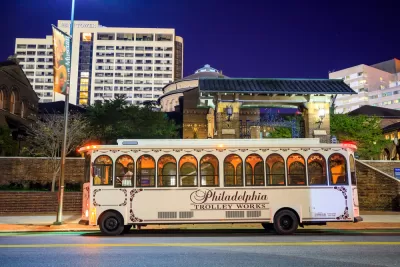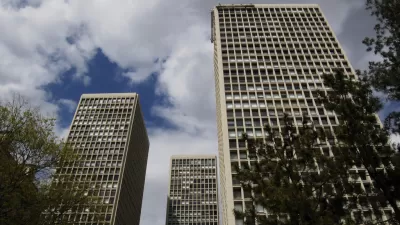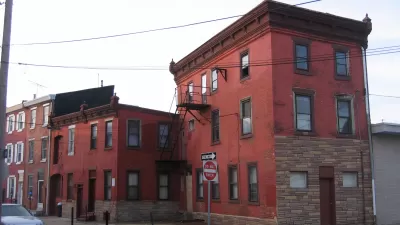Researchers from the Federal Reserve Bank of Philadelphia find evidence of displacement in Philadelphia's gentrifying neighborhoods.

[Updated January 10, 2016] "Researchers at the Community Development Studies & Education Department at the Federal Reserve Bank of Philadelphia found that Philadelphia’s gentrifying neighborhoods have lost low-cost rental units at *more than five times the rate of nongentrifying neighborhoods," according to a press release on the website of the Federal Reserve Bank of Philadelphia.
The press release explains Philadelphia's unique situation among large U.S. cities: "Although the city’s housing costs are relatively low compared with its mid-Atlantic peers, Philadelphia continues to have the highest poverty rate among the ten largest U.S. cities."
Using U.S. Census data, the study "found that between 2000 and 2014, the city lost 23,628 units with rents that fell below the $750 threshold." The study also noticed a geographic trend for the loss of affordable units: "These losses were especially acute in gentrifying neighborhoods, such as University City and the Graduate Hospital neighborhood."
Noting the economic consequences of housing constraints for low income residents, the study also calls for policymakers to take action to support the economic mobility of Philadelphia residents.
[The Federal Reserve Bank of Philadelphia contacted Planetizen to submit the following correction: The original version of this report initially misclassified three gentrifying census tracts as nongentrifying. Additionally, the gentrification type classifications have been corrected. This updated report reflects the corrected analysis.]
FULL STORY: Philadelphia Fed Research Measures Impact of Gentrification on Low-Cost Housing Stock

Planetizen Federal Action Tracker
A weekly monitor of how Trump’s orders and actions are impacting planners and planning in America.

San Francisco's School District Spent $105M To Build Affordable Housing for Teachers — And That's Just the Beginning
SFUSD joins a growing list of school districts using their land holdings to address housing affordability challenges faced by their own employees.

The Tiny, Adorable $7,000 Car Turning Japan Onto EVs
The single seat Mibot charges from a regular plug as quickly as an iPad, and is about half the price of an average EV.

Seattle's Plan for Adopting Driverless Cars
Equity, safety, accessibility and affordability are front of mind as the city prepares for robotaxis and other autonomous vehicles.

As Trump Phases Out FEMA, Is It Time to Flee the Floodplains?
With less federal funding available for disaster relief efforts, the need to relocate at-risk communities is more urgent than ever.

With Protected Lanes, 460% More People Commute by Bike
For those needing more ammo, more data proving what we already knew is here.
Urban Design for Planners 1: Software Tools
This six-course series explores essential urban design concepts using open source software and equips planners with the tools they need to participate fully in the urban design process.
Planning for Universal Design
Learn the tools for implementing Universal Design in planning regulations.
Smith Gee Studio
City of Charlotte
City of Camden Redevelopment Agency
City of Astoria
Transportation Research & Education Center (TREC) at Portland State University
US High Speed Rail Association
City of Camden Redevelopment Agency
Municipality of Princeton (NJ)





























